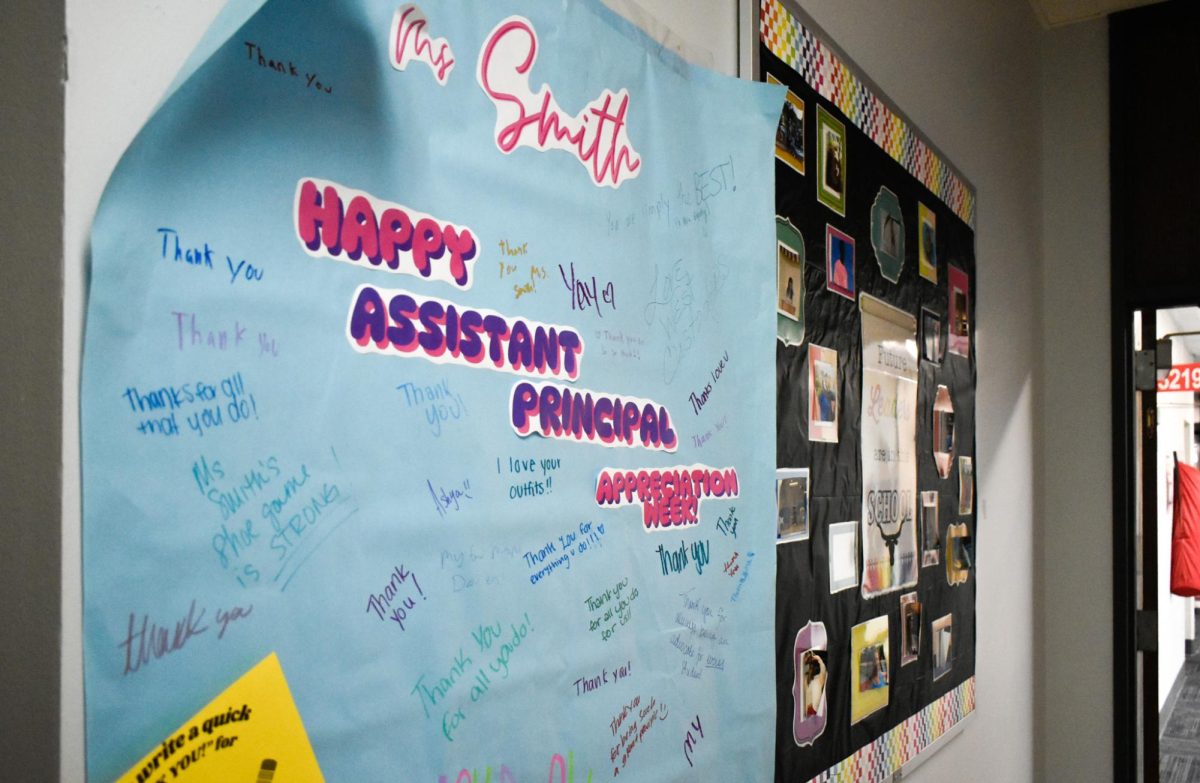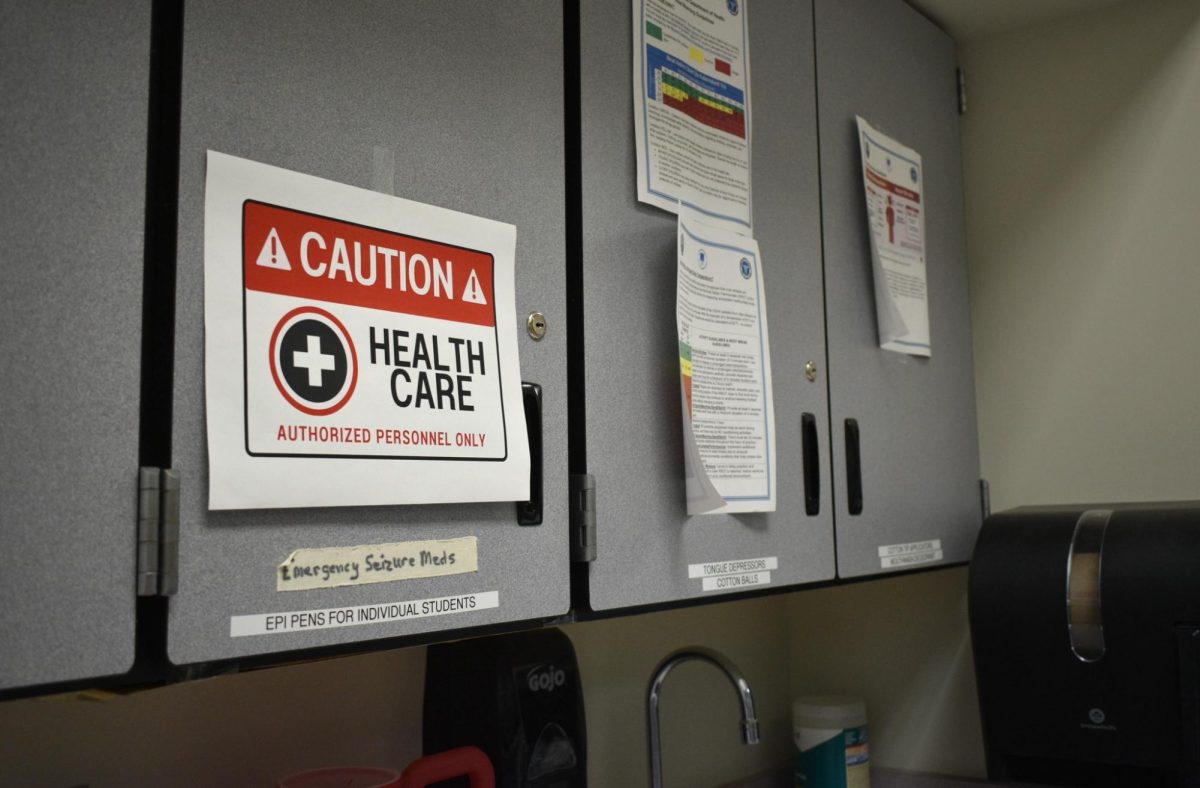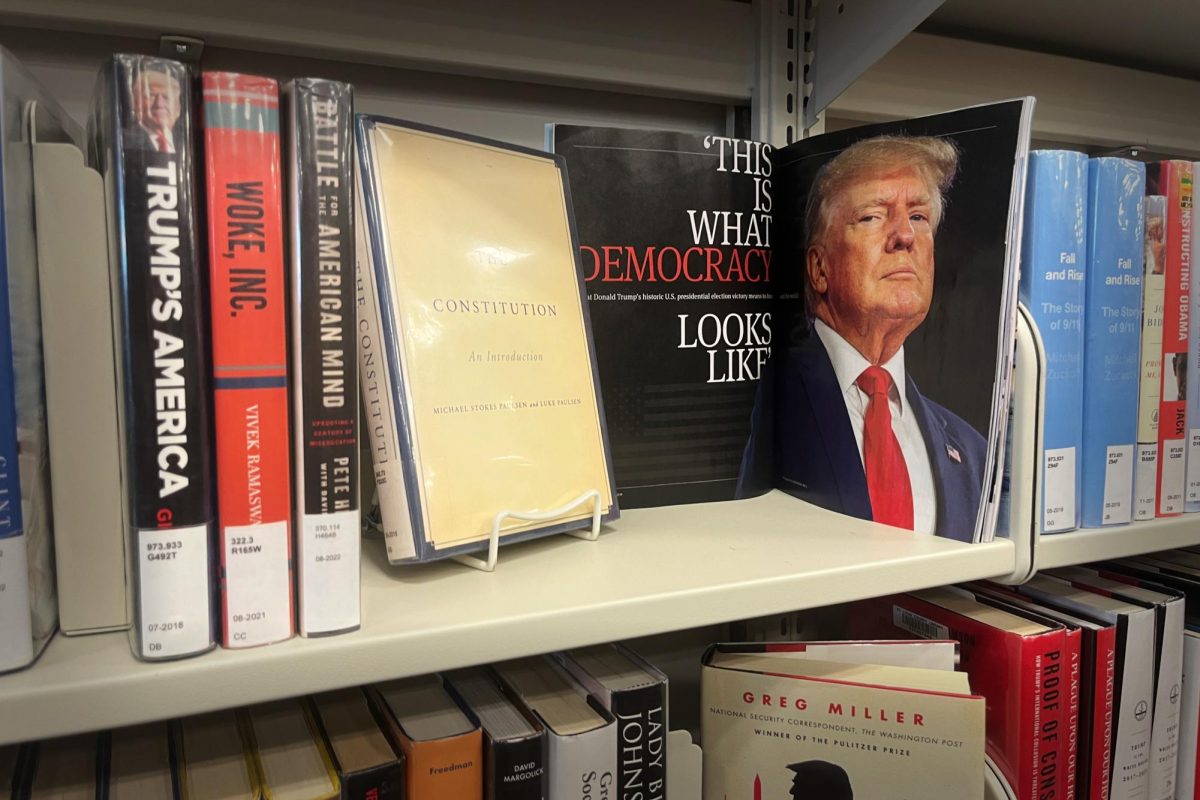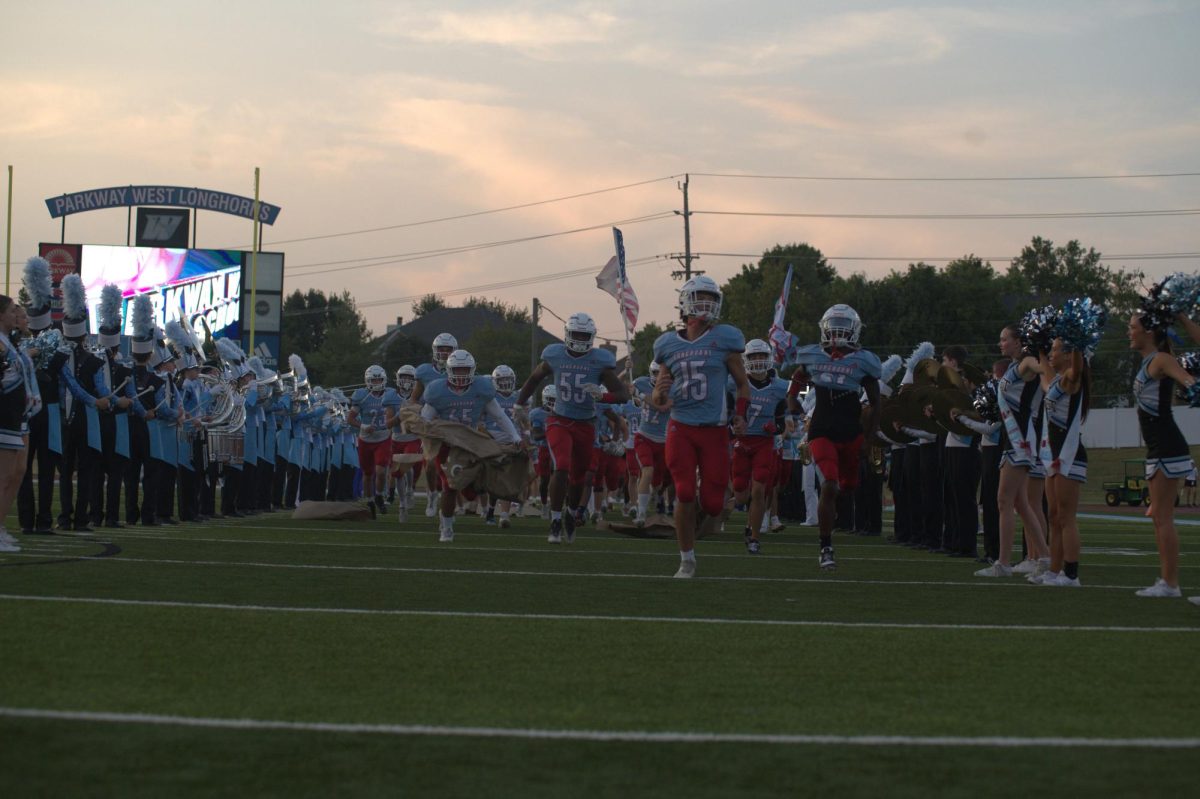Since its adoption in 1822, the state motto “salus populi suprema lex esto,ŌĆØ has appeared boldly across the Seal of the State of Missouri. This Latin phrase is translated to ŌĆ£the welfare of the people shall be the supreme law.ŌĆØ In recent years, many controversial decisions have been made across that state that beg the question: Is this motto being honored?
In a comprehensive analysis of public school systems nationwide, Missouri ranked last in public school safety and 38th in regard to overall performance, safety, funding and teaching measures. This marked MissouriŌĆÖs second consecutive year being marked as the state with the worst school safety in the country.
ŌĆ£MissouriŌĆÖs ranking as last in public school safety highlights issues such as insufficient mental health resources, inadequate security measures and possibly a lack of proactive prevention programs. As aŌĆŗn [assistant principal], my biggest concern is ensuring a safe and secure learning environment where students and staff feel protected both physically and emotionally. When students donŌĆÖt feel safe, they experience anxiety and stress that impede concentration, memory and overall cognitive function,ŌĆØ assistant principal Kate Piffel said. ŌĆ£I have witnessed firsthand, as an educator for 28 years, that chronic exposure to unsafe environments can lead to absenteeism, disengagement and lower academic performance. Teachers also struggle to teach effectively in disruptive or tense atmospheres, which affects the entire school community.ŌĆØ┬Ā
The magnitude and scale of these systemic issues prove that the state government needs to step in. The level of involvement the government should have in citizens’ day-to-day lives is a long-standing debate, especially regarding education. However, when nearly 900,000 students stand to be victims of the poor Missouri public school system, thorough government involvement seems vital.┬Ā
Race and financial status are two major factors that separate children across the state and play a large role in the issues the school system faces today. In Parkway, the median household income is $140,940, nearly double the state average of $71,689. Meanwhile, the Farmington School District in rural Missouri has a reported median household income of $27,963. Statewide, not all school districts have access to equally wealthy patrons, creating discrepancies that must be addressed on a case-by-case basis. Racial disparities further complicate the problem as financial resources and racial backgrounds donŌĆÖt always align. In Missouri, there are poor pockets in both predominantly white and ethnically diverse communities. That means policies cannot always assume a direct connection between race and wealth. These clear disparities highlight the problem of implementing blanket laws, which are unlikely to work effectively for such a diverse group of people.┬Ā
Amidst these challenges within public schools, on July 9, Missouri Governor Michael Kehoe signed Senate Bill 68, implementing many changes to the school system, including major modifications in safety and disciplinary policy. However, these new updates appear to overlook the exact disparities that are at the root of MissouriŌĆÖs education problem.┬Ā
ŌĆ£Many policies created by Missouri lawmakers focus on surface-level issues without fully tackling underlying socioeconomic disparities, funding inequities and mental health crises that disproportionately affect public schools in Missouri,ŌĆØ Piffel said. ŌĆ£To bridge these gaps, lawmakers need to [do things such as] invest more in equitable school funding [and] support community-based services that address poverty and trauma.ŌĆØ┬Ā
Senate Bill 68 particularly highlights a transformative crackdown on personal communication device usage. Missouri was one of 18 states that implemented an outright ban on personal communication devices, defined in Section 162.207 of the bill as ŌĆ£portable devices that are used to initiate, receive, store, or view communication, information, images, or data electronically.ŌĆØ Before the passing of this bill, in April, the Parkway School District voted to implement a different phone removal policy.┬Ā┬Ā
Amid the rise in threats and violence on campuses across the country, taking away students’ means of communication raises concern. Rather than working to implement measures that would strengthen school safety and address the root causes of violence, government officials have placed a large emphasis on the removal of personal devices in schools. By prioritizing such policies over substantive efforts to protect students, the state diverts invaluable attention and resources away from addressing the threats that endanger school communities.┬Ā
As the government, legislators are elected to represent the will of the people and serve communities by responding to the most urgent problems, especially when this concerns the vulnerable populations of young students. In failing to do so, MissouriŌĆÖs governmental leaders risk neglecting the very duties they were entrusted to fulfill.┬Ā
In this new, conflicting and unique position under the phone policy, Superintendent Melissa Schneider joined the Parkway staff in July during these major changes to the school system.┬Ā
ŌĆ£The first week of school, I went and visited each middle and high school. I was watching how kids were interacting with each other and if I was going to see [students struggling] with not being able to use cell phones. I was pleasantly surprised as I saw kids eating lunch together and interacting in the hallways. I didn’t see one cell phone out. One thing that I like to do is be able to actually get into buildings and see how kids are actually doing with new rules,ŌĆØ Schneider said.
Teachers, administrators and students all have different perspectives about these restrictive policies. The ongoing debate and conflict highlight a disconnect between lawmakers and the complex realities of school communities. While the majority of students comply with these policies to avoid disciplinary consequences, compliance does not necessarily indicate studentsŌĆÖ actual opinions or benefits to learning at all. In fact, prior to these bans, cell phones served numerous educational purposes to teachers in their classrooms. Aside from academic interests, this ban potentially conflicts with the health and safety of students and the wishes of parents. Many parents fear for their young children in emergency situations, in which students fear for their lives and well-being. The idea that cell phone usage is the largest factor in the decline in student health is far-fetched, especially when itŌĆÖs used to justify a restrictive policy in an already flawed education system.
ŌĆ£I don’t think that [banning phones] improves mental health at school at all. I feel [more] stressed not being able to reach my parents, especially [because I have] anxiety. When we have our phones at school, when we are done with all our work, itŌĆÖs a way of taking time for [ourselves]. I think having your phone can help your mental health because [youŌĆÖre] able to talk to friends who aren’t in your classes,ŌĆØ junior Aminah Hilaly said. ŌĆ£When I was able to have my phone out at school, I would text my friends or my family to help me be less stressed throughout the day. Having phones [during] teaching is a problem, but taking away our phones isn’t solving the problem; it makes the problem worse.ŌĆØ
This is not the first time the Missouri government and public school officials have ignored and failed to consider student perspectives. In a July filing, the Missouri National Education Association sued the State of Missouri and many members of the state government. This suit came after a bill was passed that allows over $50 million in taxpayer money to be used for scholarships for private school students. The idea that public funds could be used to help private schools, while the public school system is struggling, was not well-received. However, in August, a Cole County judge ruled that these funds could continue to fund private school scholarships.┬Ā
In December 2024, another lawsuit was filed, this time on behalf of a middle school student in the Jackson school district who was suspended due to a miscommunication on social media. This suspension came after a student repeated a threat she had heard from an anonymous student, and after attempting to clear up this confusion, she was still suspended.┬Ā This case shed light on the possibly unconstitutional rules in many school handbooks as the debate shifted toward the poor treatment of students from the public school system.┬Ā
Senate Bill 68 continues this pattern of government overlooking and ignoring the treatment and safety of students. As a result, local school districts like Parkway have both the opportunity and responsibility to support students in ways that the government has failed to. While this bill requires an overly strict blanket policy, the government actually does leave a large amount of authority to local districts. The bill allows exceptions to phone usage for learning time at the discretion of the district and allows the district to create and implement its own disciplinary policy.┬Ā
At Parkway, students and staff must work together to support each other and reflect the needs of the community. Hearing and implementing the ideas of students is necessary to build and maintain trust during such an uncertain time. Schneider came into Parkway with this approach, striving to maintain an advisory group composed of a diverse group of students to gain insight from their perspectives.
ŌĆ£[Members of this advisory group] can actually [be] the voice for other students. We plan to convene a few times this year. If they report something that gets me a little bit more curious, I may contact principals and set up an opportunity to sit with perhaps their student council or other groups of students who will paint a picture of what their day-to-day experience is in school,ŌĆØ Schneider said.
Initiatives like this empower Parkway to embody MissouriŌĆÖs motto of putting the welfare of the people at the center of decision-making, even as the state government falls short. By listening to students and adapting policies to meet real needs, Parkway can demonstrate that when local districts take responsibility, they can protect and uplift education.┬Ā

![Leaning on the podium, superintendent Melissa Schneider speaks to Parkway journalism students during a press conference. Schneider joined Parkway in July after working in the Thompson School District in Colorado. ŌĆ£My plan [to bond with students] is to get things on my calendar as much as possible. For example, being in [classes] is very special to me. I am trying to be opportunistic [meeting] kids [and] being in [the school] buildings. I have all the sports schedules and the fine arts schedules on my calendar, so that when I'm available, I can get to them,ŌĆØ Schneider said.](https://pwestpathfinder.com/wp-content/uploads/2025/09/IMG_5425-1200x943.jpeg)
![Dressed up as the varsity girlsŌĆÖ tennis coach Katelyn Arenos, senior Kate Johnson and junior Mireya David hand out candy at West HighŌĆÖs annual trunk or treat event. This year, the trunk or treat was moved inside as a result of adverse weather. ŌĆ£As a senior, I care less about Halloween now. Teachers will bring their kids and families [to WestŌĆÖs Trunk or Treat], but there were fewer [this year] because they just thought it was canceled [due to the] rain. [With] Halloween, I think you care less the older you get,ŌĆØ Johnson said.](https://pwestpathfinder.com/wp-content/uploads/2025/10/DSC00892-1-1200x800.jpg)


![Red, white and blue, the American flag holds the values of our democracy. The fight that we once endured has returned, as student journalists and senior correspondents across the country are losing their voices due to government control. ŌĆ£[Are] the White House and [the] government limiting free speech [and] freedom of the press? Yes [they are],ŌĆØ chief communications officer of the Parkway School District and former journalist Elisa Tomich said.](https://pwestpathfinder.com/wp-content/uploads/2025/03/Untitled-design-14.jpg)
![A board in the Parkway West counseling department displays pennants of selective universities. With a wide range of students interested in attending, itŌĆÖs important that these schools have clear priorities when deciding who to admit. ŌĆ£[Washington University] had the major that I wanted, psychology, philosophy, neuroscience. That's a holistic study of the brain, and [WashU is] the only college in the world that offers that. That's the main reason I wanted to go; I got into that program,ŌĆØ senior Dima Layth said.](https://pwestpathfinder.com/wp-content/uploads/2025/02/Flag-1.png)

![Within the U.S., the busiest shopping period of the year is Cyber Week, the time from Thanksgiving through Black Friday and Cyber Monday. This year, shoppers spent $13.3 billion on Cyber Monday, which is a 7.3% year-over-year increase from 2023. ŌĆ£When I was younger, I would always be out with my mom getting Christmas gifts or just shopping in general. Now, as she has gotten older, I've noticed [that almost] every day, I'll open the front door and there's three packages that my mom has ordered. Part of that is she just doesn't always have the time to go to a store for 30 minutes to an hour, but the other part is when she gets bored, she has easy access to [shopping],ŌĆØ junior Grace Garetson said.](https://pwestpathfinder.com/wp-content/uploads/2024/12/DSC_0249.JPG-1200x801.jpg)

![Senior Sally Peters stands in the history hallway, contemplating her choices in the 2024 United States and Missouri elections on Nov. 5. As a member of Diplomacy Club, Peters has discussed key candidates and issues in contemporary American politics. ŌĆ£[As students], we're starting to become adults. We're realizing how much the policies that are enforced and the laws that make it through the House and Senate are starting to affect us. [Opportunities such as] AP [U.S.Government] and Diplomacy Club [make elections feel] a lot more real,ŌĆØ Diplomacy Club vice president and senior Nidhisha Pejathaya said.](https://pwestpathfinder.com/wp-content/uploads/2024/10/Flag-1-1.png)
![Mounting school pressure can leave many students overworked and overstressed. Schools must give students the necessary resources to help assuage student mental health issues and prevent the development of serious crises. ŌĆ£The biggest thing [schools] can do [to protect student mental health] is offer more time [to do work], like a study hall, or offer more support from teachers so that students don't feel stressed out and can get help in areas that they need,ŌĆØ senior Bhavya Gupta said.](https://pwestpathfinder.com/wp-content/uploads/2024/09/unnamed-4.jpg)

![Sophomore Shree Sikkal Kumar serves the ball across the court in a match against Lindbergh. Sikkal Kumar has been a varsity member of the varsity girlsŌĆÖ tennis team for two years, helping her earn the number two rank in Class 2 District 2.ŌĆ£When matches are close, itŌĆÖs easy to get nervous, but I [ground] myself by[staying] confident and ready to play,ŌĆØ Sikkal Kumar said.](https://pwestpathfinder.com/wp-content/uploads/2025/11/DSC2801-1200x798.jpg)
![Focused on providing exceptional service, sophomore Darsh Mahapatra carefully cleans the door of a customerŌĆÖs car. Mahapatra has always believed his customers deserve nothing less than the best. ŌĆ£[If] theyŌĆÖre trusting us with their car and our service, then I am convinced that they deserve our 100 percent effort and beyond,ŌĆØ Mahapatra said.](https://pwestpathfinder.com/wp-content/uploads/2025/10/DSC_0018-1200x800.jpg)
![Sophomore Aleix Pi de Cabanyes Navarro (left) finishes up a soccer game while junior Ava Muench (right) warms up for cross country practice. The two came to Parkway West High School as exchange students for the 2025-2026 school year. ŌĆ£The goal for the [exchange] program is to provide opportunities for both Parkway students and our international exchange students to learn about other cultures, build connections and become confident, capable, curious and caring ŌĆö ParkwayŌĆÖs Four CŌĆÖs ŌĆö in the process,ŌĆØ Exchange Program Lead Lauren Farrelly said.](https://pwestpathfinder.com/wp-content/uploads/2025/10/Feature-Photo-1200x800.png)
![Gazing across the stage, sophomore Alexis Monteleone performs in the school theater. The Monteleone familyŌĆÖs band ŌĆ£Monte and the MachineŌĆØ has been releasing music since 2012, but Alexis started her own solo career in 2024 with the release of her first single, Crying Skies. ŌĆ£My whole family is very musical, [and I especially] love writing [songs with them],ŌĆØ Monteleone said.](https://pwestpathfinder.com/wp-content/uploads/2025/09/DSC7463-1200x798.jpg)

![Leaping through the air, senior Tyler Watts celebrates his first goal of the season, which put the Longhorns up 1-0 against the Lafayette Lancers. Watts decided to play soccer for West for his last year of high school and secured a spot on the varsity roster. ŌĆ£[Playing soccer for West] is something I had always dreamed of, but hadnŌĆÖt really had a good opportunity to do until now. ItŌĆÖs [really] fun being out [on the field], and IŌĆÖm glad I decided to join the team. ItŌĆÖs just all about having fun with the boys and enjoying what time we have left together,ŌĆØ Watts said.](https://pwestpathfinder.com/wp-content/uploads/2025/09/DSC_1951-1200x855.jpg)
![Shifting global trade, President Donald TrumpŌĆÖs tariffs are raising concerns about economic stability for the U.S. and other countries alike. ŌĆ£[The tariffs are] going to pose a distinct challenge to the U.S. economy and a challenge to the global economy on the whole because it's going to greatly upset who trades with who and where resources and products are going to come from,ŌĆØ social studies teacher Melvin Trotier said.](https://pwestpathfinder.com/wp-content/uploads/2025/05/MDB_3456-1200x800.jpg)

![Pitching the ball on Apr. 14, senior Henry Wild and his team play against Belleville East. Wild was named scholar athlete of the year by St. Louis Post-Dispatch after maintaining a high cumulative GPA and staying involved with athletics for all of high school. ŌĆ£ItŌĆÖs an amazing honor. I feel very blessed to have the opportunity to represent my school [and] what [it] stands for,ŌĆØ Wild said.](https://pwestpathfinder.com/wp-content/uploads/2025/05/unnamed-6-1200x714.jpg)